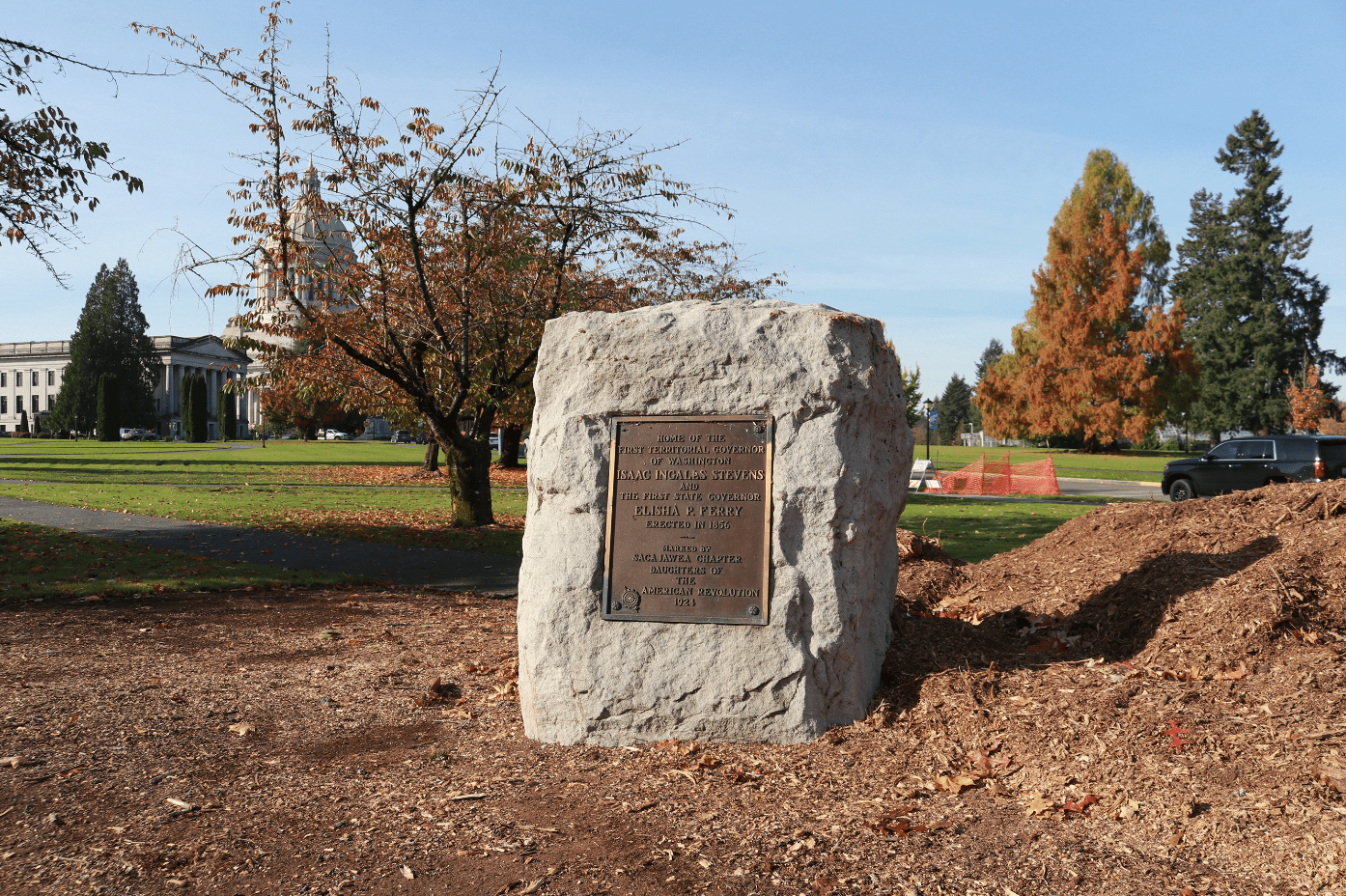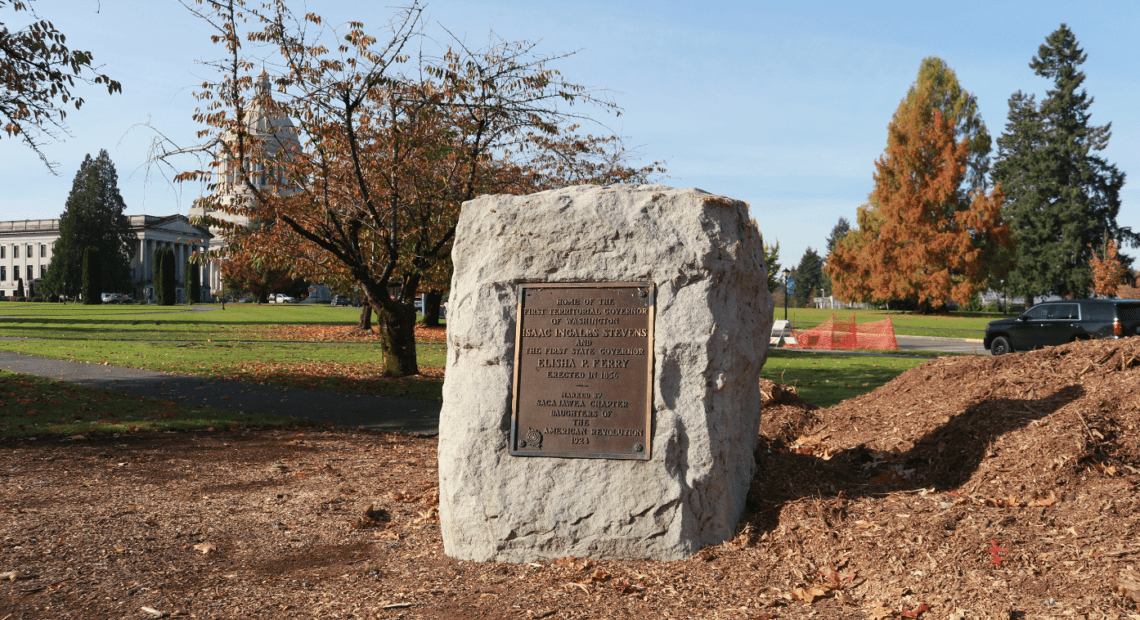
Nearly 100-Year-Old Historic Marker Stolen From Washington Capitol Campus
READ ON
A nearly 100-year-old historical marker has been mysteriously stolen from Washington’s Capitol Campus and, with no leads on who took it, the state patrol is now asking the public for help solving the crime.
The bronze plaque commemorated the location of the home of Washington’s first territorial governor, Isaac Ingalls Stevens. Washington’s first post-statehood governor, Elisha P. Ferry, also lived there when he served as a territorial governor.
The approximately 15-by-20-inch plaque was affixed to a large monument stone located along busy Capitol Boulevard, a short distance from the state patrol headquarters and also not far from the Capitol building. It was placed there in 1924 by the Sacajawea Chapter of the Daughters of the American Revolution (DAR).
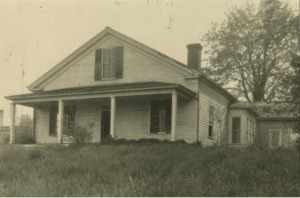
The stolen plaque marked the location of the home of Washington’s first territorial and first state governors on what is today’s Capitol Campus. CREDIT: WA State Archives
“I am just very sad and it is discouraging,” said Shirley Stirling, the DAR’s state historian and a member of the Sacajawea Chapter.
Stirling said this was the fourth theft of a DAR monument in Washington in the last couple of years. She suspected thieves may target bronze plaques because they can be sold to unscrupulous recyclers as scrap.
A member of the Capitol Campus visitor services bureau first noticed the marker was missing on May 12. The theft was reported to the state patrol at the time, but not made public until Thursday when the patrol issued a news release seeking tips from the public.
“Our troopers were doing some investigative work, were not getting many leads or anything so we decided to enlist the public’s help to try to solve this,” said the patrol’s Sgt. Darren Wright.
Wright confirmed that a likely reason for the theft of the plaque was “probably to melt it down for a few bucks.”
The theft was discovered just days after an estimated 1,500 people attended an unpermitted rally not far from the monument to protest Gov. Jay Inslee’s “Stay Home” order. But Wright said it’s unlikely there was a connection between the two events.
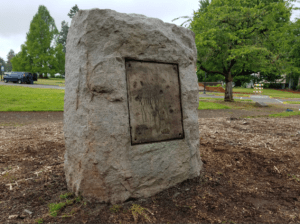
The theft of a nearly 100-year-old commemorative plaque on Washington’s Capitol Campus was first noticed on May 12. CREDIT: WA State Archives
“It would take some time and take some effort to [steal the plaque], so it’s just an assumption that it was probably done at night sometime, not in the middle of broad daylight,” Wright said.
Despite cameras and a state patrol presence, the Capitol Campus is not immune to acts of vandalism, including spray painting and graffiti. Even brazen crimes are not unprecedented.
In June 2014, two women were caught on camera after they managed to enter the governor’s office from a second floor balcony. Once inside, they stole several items including a ceremonial trooper hat and a bottle of wine. In a fluke, the women were later arrested and the items recovered after a state trooper pulled over a speeding car and spotted the stolen loot.
In 2015, security at the governor’s mansion was beefed up following two trespassing incidents. And last year, access to the House and Senate public galleries was limited when the Legislature isn’t in session after a man was able to access the empty floor of the House by climbing under a brass railing and making his way along a marble ledge before dropping down onto the House rostrum.
“Vandalism and theft happen from time to time and it’s always really disappointing, especially when it affects something of historic significance like a marker or a monument,” said Linda Kent, a spokesperson for the Washington Department of Enterprise Services, which oversees the Capitol Campus.
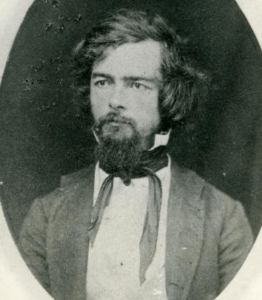
Isaac Ingalls Stevens was Washington’s first territorial governor. A commemorative plaque marking the location of his house, on land that is now part of the state’s Capitol Campus, was stolen earlier this month. CREDIT: WA State Archives
According to a DAR history, the plaque marked the spot where in 1856 Gov. Stevens had a one-and-a-half-story home built for his family that was described as a “plain, square dwelling with a wide hall.” Subsequent territorial governors, including Gov. Ferry, who later served as the first governor following statehood, also lived in the house.
In a dramatic moment, the house was “razed in secret and amid controversy” in the dark of night in 1929 to make way for the current Capitol Campus, according to the DAR history.
The estimated value of the stolen marker is $6,500. It has not been determined yet if it will be replaced.
However Stirling, the DAR historian, is still hopeful the plaque will be recovered.
“We would be so very happy to get it back and I must say that we have had help from the public before and so I hope that this will happen again,” Stirling said.
If you have information about the stolen plaque, you’re asked to contact Trooper Nick Casto at 360-596-3990
Related Stories:
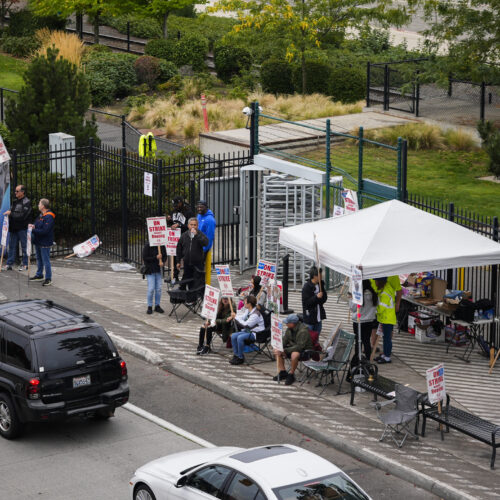
Striking workers in Washington could get access to unemployment claims if bill passes
A proposed bill that would give striking workers some access to the state’s unemployment benefits is getting closer to becoming law in Washington.
Majority lawmakers in the House Committee on Labor & Workplace Standards moved the bill out of committee on Friday, with a recommendation to pass it. This, after the bill narrowly passed the senate with 28 yeas and 21 nays earlier this month.
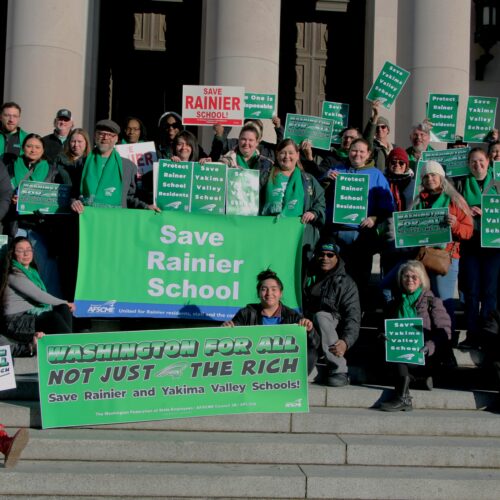
State considers closure of residential facilities for people with disabilities
Ever since he started working at Rainier School in Buckley, Washington, Willis McNabb has been hearing that the state was going to close it. This time, he said it feels more real.
“I’ve never been so worried as I am today,” McNabb said.
Since 1991, McNabb has worked at Rainier, which gives people with intellectual and developmental disabilities a place to find community, learn, work and receive comprehensive health treatment.
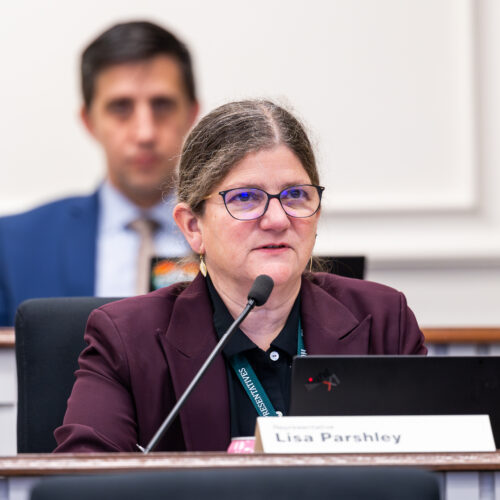
Washington bills attempt to give public workers power to bargain on AI
There are only so many things employees get to have a say over in their jobs. Which laptops or messaging app your office uses might not be your call.
For a while, decisions on the use of technology in the workplace have been up to management for public workers in Washington state, thanks to a law passed in 2002. But now, some lawmakers want to pass an exemption that would allow public sector employees to bargain on one broad and ever-changing technology — artificial intelligence.

